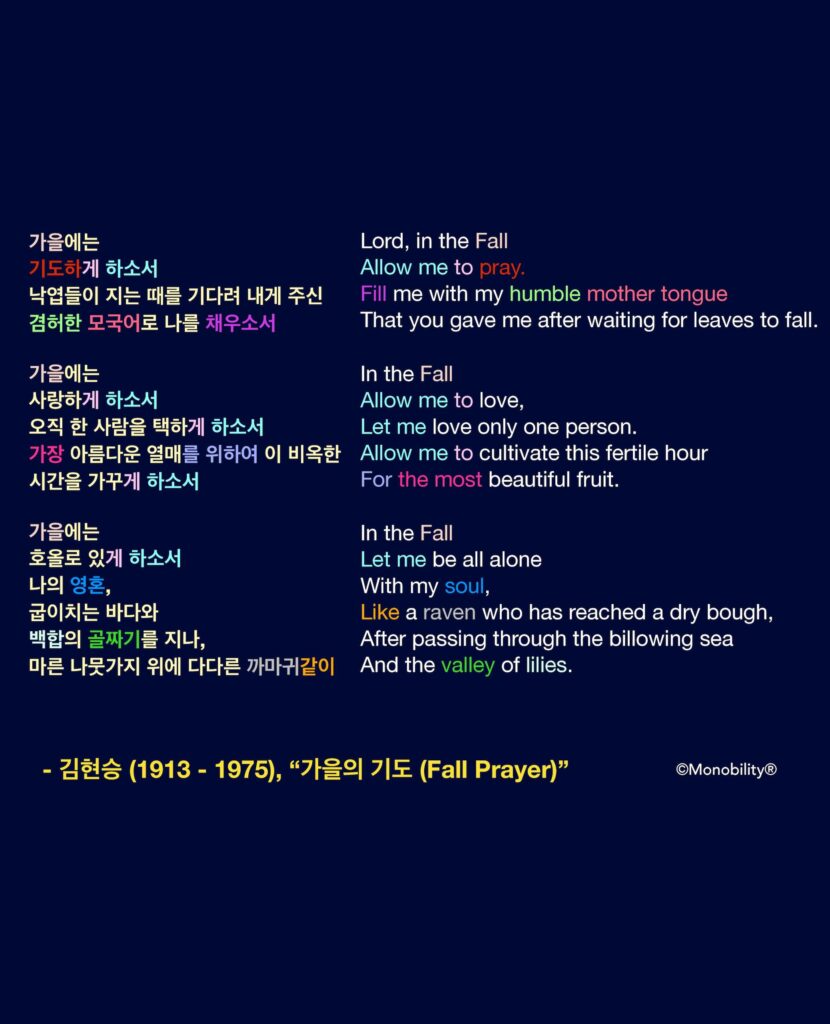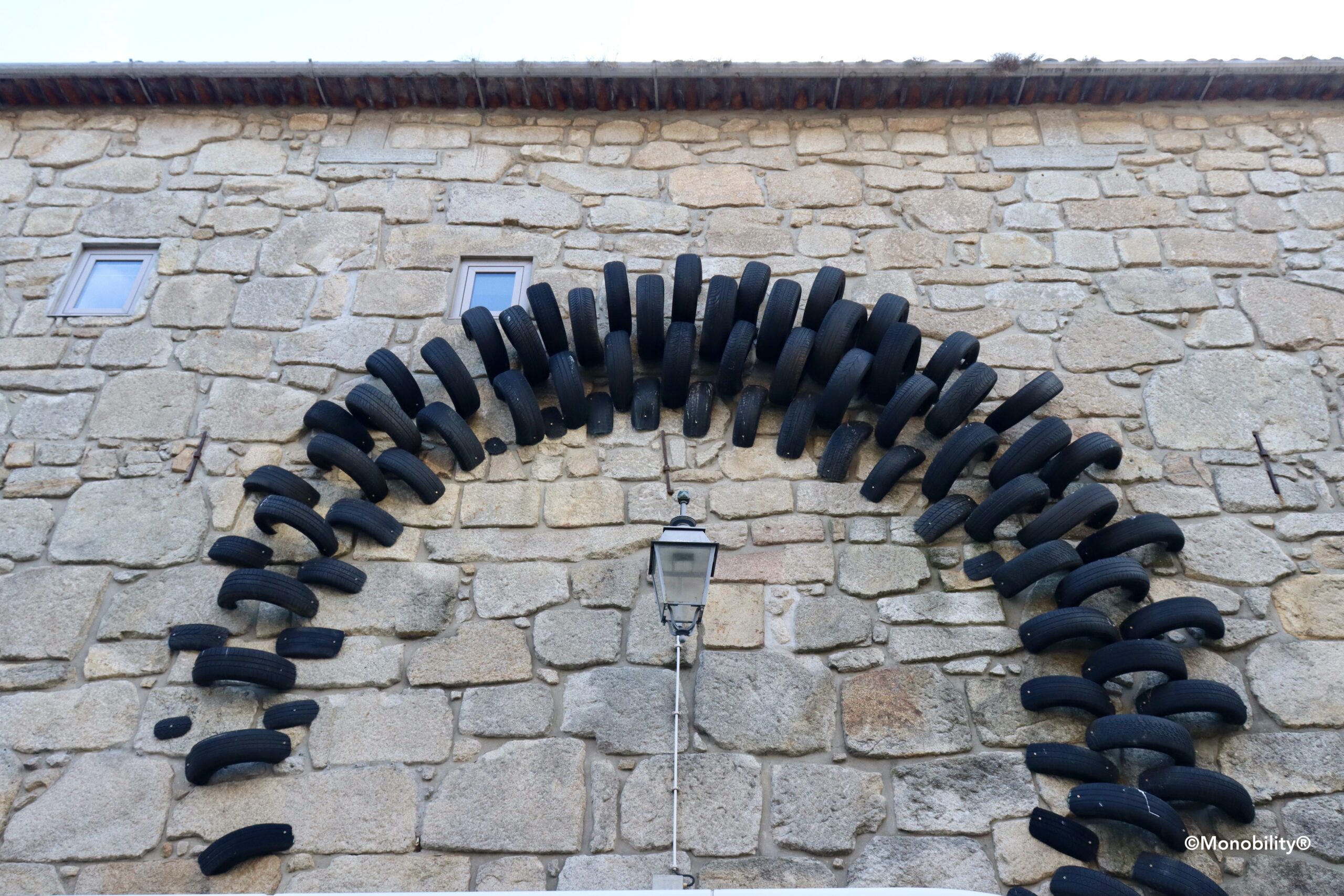가을에는
기도하게 하소서
낙엽들이 지는 때를 기다려 내게 주신
겸허한 모국어로 나를 채우소서
가을에는
사랑하게 하소서
오직 한 사람을 택하게 하소서
가장 아름다운 열매를 위하여 이 비옥한
시간을 가꾸게 하소서
가을에는
호올로 있게 하소서
나의 영혼,
굽이치는 바다와
백합의 골짜기를 지나,
마른 나뭇가지 위에 다다른 까마귀같이
– 김현승 (1913 – 1975), “가을의 기도 (Fall Prayer)”
Lord, in the Fall
Allow me to pray.
Fill me with my humble mother tongue
That you gave me after waiting for leaves to fall.
In the Fall
Allow me to love,
Let me love only one person.
Allow me to cultivate this fertile hour
For the most beautiful fruit.
In the Fall
Let me be all alone
With my soul,
Like a raven who has reached a dry bough,
After passing through the billowing sea
And the valley of lilies.
When you have lived away from your homeland, roaming around this planet for so long that you speak another people’s tongue as your primary language in daily life, 김현승’s “가을의 기도 (Fall Prayer)” approaches you like a fresh wind in the Fall and plunges your soul into the deepest part of your brain — your core that has so far kept your mother tongue, whether it’s a regional dialect or a totally different language, unused but intact, like in an immense safe of memory, recorded in your mother’s voice that you heard when you were very little. The voice you hear again all of a sudden in the prime of your life pulls at your heartstrings, and makes you kneel and pray, even if you didn’t pray for a long time. It’s a most humble prayer, because now it’s in your own mother’s tongue, which was humiliated by your own story of life.
In the end, after all these Korean words and dramas and culture, if there is just one thing you can learn from the Korean language, it is humility – the ability and quality to think that you are no better than others even when you win, and the power of smiling calmly when all other people around you seem pompously proud of themselves.
How humble is your mother tongue?

가을 Fall, Autumn
기도 prayer; 기도하다 to pray
기도하게 하다 to let … pray [ (verb)-게 하다 to let … / to allow … ]
(verb)-소서 May … [-소서 is a unique verb ending exclusively used for a prayer. ]
낙옆 falled leaves; 낙옆이 지다 leaves fall [ idiomatic ]
때 time
기다리다 to wait; 기다려 = 기다려서 after waiting [ 기다리+어 = 기다려 ]
내게 to me [ dative ]
주다 to give; 주신 which … gave [ 주 + 시 (respect particle) + ㄴ (relative clause ending) ]
겸허 humility, modesty; 겸허한 humble, modest
모국어 mother tongue, native language
채우다 to fill; 채우소서 May you fill … [ 채우-소서 verb ending for prayers ]
사랑하다 to love
오직 only
한 one
사람 person
택하다 to choose
가장 the most
아름다운 beautiful
열매 fruit; 열매를 위하여 for the fruit [ (noun)-을/를 위하여 for, for the sake of … ]
비옥한 fertile (land)
시간 time
가꾸다 to cultivate, to care (a garden, flowers, fruits, etc. )
호올로 = 홀로 alone [ here, the poet adopted a rare vowel lengthening for poetic effects; 홀로 is the correct spelling used in daily life ]
영혼 soul, spirit
굽이치다 to undulate, to billow, to wave
바다 sea, ocean
백합 lily
골짜기 valley
지나다 to pass through, to go through (a place)
마른 dry
나뭇가지 branch, bough [ 나무 (tree) + 가지 (branch) = 나무 + ㅅ + 가지 = 나뭇가지 ]
위에 above, on, over
다다르다 to reach, to arrive; 다다른 who/which reached [ (verb)-ㄴ relative clause ending ]
까마귀 crow, raven; 까마귀같이 like a crow [ (noun)-같이 like … = -처럼 ( simile ) ]
Check out our Facebook for much more:



